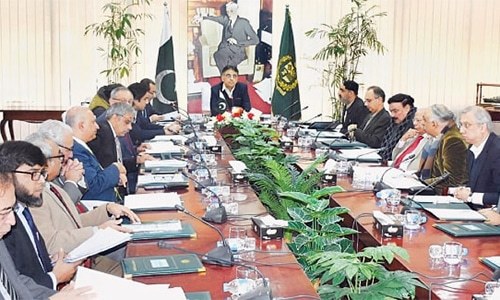ISLAMABAD: Expressing concern over higher levels of fiscal deficit and core inflation, the State Bank of Pakistan (SBP) on Thursday hiked its benchmark interest rate by 25 basis points (BPS) to 10.25 per cent as the country gets closer to meet the International Monetary Fund (IMF) condition for demand compression.
This is the sixth consecutive increase in policy rate that saw a cumulative 4.5pc hike (450bps) since January 2018. “We are almost at the peak now,” SBP Governor Tariq Bajwa remarked at the launch of Monetary Policy Statement — a rare such event at the federal capital.
“They [IMF staff] always want us to do more but we will explain to them what we have achieved so far and what more could be done when we go to them” for a programme, he added. An official hinted at settlement with the IMF at 11pc policy rate.
Mr Bajwa said the challenges to Pakistan’s economy continue to persist despite stabilisation measures over the past year. These include elevated fiscal deficit, high current account deficit despite some improvement and ‘persistently high’ core inflation. “This situation calls for continued consolidation efforts”, he added.
The governor also expressed concern over 4.3 times surge in government borrowing from the SBP to Rs3.77 trillion but did not agree that commercial banks appeared dictating the discount rate hike by staying away from government papers during low interest period. He said the monetary policy was driven by macroeconomic fundamentals and the banks had shown threefold increase in their interest during the recent auction.
The central bank expected the fiscal deficit in first half of fiscal year 2019 to be higher than the same period last year, which showed that despite a sharp cut in Public Sector Development Programme releases and rationalisation of tariffs and duties, fiscal consolidation remains a challenge.
He said the overvaluation of rupee over a longer period was a cause of de-industrialisation and the central bank was not in favour of unnatural intervention in the market and believed the macroeconomic indicators should set the natural equilibrium.
However, he did not respond to a question as to who was responsible for unnatural overvaluation of the rupee. When asked for the reason of $1.147bn decline in foreign exchange reserves during a short period (Dec 20-Jan 8) in the absence of any major debt repayments and unnatural intervention, the governor said the outflow was on account of defence payment, debt servicing and said the SBP also injected funds during the period but declined to go into details.
The governor said the rise in inflation and the continuation of economic challenges was taking a toll on economic performance. Real economic activity has witnessed a marked slowdown during the first half of the year.
Large-scale manufacturing, which has strong backward and forward linkages, saw a net contraction of 0.9pc during the first five months of the fiscal year, mainly due to a moderation in domestic demand and some sector specific challenges. Meanwhile, all major kharif crops have recorded a decline in production from last year’s levels.
The governor said the average headline consumer price inflation (CPI) stood at 6pc for the first half of FY19, considerably higher than the 3.8pc same period last year. The headline YoY inflation showed some moderation over the last two months due to a sharp fall in prices of perishable items and petroleum products.
Despite these positives, core inflation as measured by non-food-non-energy components of the CPI basket has reached 8.4pc in December 2018. Going forward, the second round impacts of the exchange rate movements, upward adjustments in gas and electricity tariffs, and higher government borrowings from SBP are likely to be offset by the lagged impact of the increase in policy rates and the fall in international oil prices, on inflation. Accordingly, the projected range of inflation remains unchanged at 6.5 to 7.5pc.
Credit to private sector saw a net expansion of Rs570.4bn during Jul-Dec FY19 — almost double the level of expansion during the same period last year. This growth is largely attributed to higher cost of raw materials (cotton, petroleum products, etc), continuation of capacity expansion in power and construction-allied industries (especially cement and steel), and favorable liquidity conditions due to retirement of government borrowing from commercial banks.
On external front, the current account deficit (CAD) dropped 4.4pc YoY during first half of the year to $8bn, and was largely driven by a sharp deceleration in import of goods and services. The impact of stabilisation measures is amply visible from non-oil imports, which saw a contraction of 4.4pc during the first half of FY19 against an increase of 19.1pc during the same period last year. A marginal increase in exports and a healthy growth in remittances also helped contain the CAD. The financing of CAD, nevertheless, remained challenging, the committee notice said.
Published in Dawn, February 1st, 2019














































